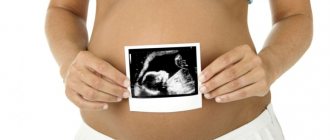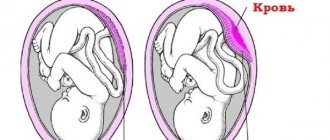Fetal development at 29 weeks of gestation
At this time, the child continues to actively prepare for birth. His own immune system starts working. Thermoregulation processes are being honed.
- At this time, the baby’s blood has a constant composition. The bone marrow fully copes with its functions.
- The digestive system will already be able to digest breast milk.
- The kidneys are actively working. Every day they distill 500 ml of water, which is discharged into the amniotic fluid.
- The baby continues to swallow amniotic fluid, but now it enters the stomach not only through the mouth, but also through the nasal passages. The plugs that previously blocked them have dissolved.
- The baby is already able to distinguish smells. It actively responds to light and sound.
- The child learns to focus his gaze.
- The appearance of the fetus continues to undergo significant changes. His skin gradually becomes smoother, the original lubricant and fuzz disappear. Just a little more and the baby’s first fat folds will begin to appear.
- The genitals continue to develop, but at the same time they are already practically formed.
- All the baby’s teeth are still inside the gums, but at this stage they begin to be covered with enamel.
- Internal organs begin to work in the system. The child's heart beats loudly enough that it can be heard without any problems using a phonendoscope.
- Every day the child increases his weight and height. Its body weight is about 1200 g, and its height is approximately 38 cm.
- The baby's muscles and ligaments become stronger, which makes the child stronger. It is for this reason that he can push quite noticeably from the inside.
There is not enough room in the stomach to make active movements, so the baby will no longer be able to perform full somersaults.
Fetal development
Week 29 - how many months is it? This is 6 calendar months and 20 days of pregnancy, or 7 obstetric months and 1 week. The moment of childbirth is getting closer.
The child’s height is 36–37 cm, the approximate weight at 29 weeks of pregnancy is 1200 grams. The fetus has already grown quite a lot and it is becoming increasingly difficult for it to fit into the uterine cavity. The child’s movements are no longer so sweeping and chaotic.
The skin begins to lose its vellus cover. First, the shoulders and lower back become bald, then other parts of the body. In the same sequence, a little later the original lubricant will disappear - the secretion of the sebaceous glands that accumulates on the surface of the skin.
The arms and legs are still thin, but subcutaneous fat accumulates and forms characteristic folds in the joint area.
The visual analyzer is being improved. The baby blinks rhythmically, tries to focus his gaze, and distinguishes primary colors.
The baby's nostrils are gradually cleared of mucus accumulation, allowing amniotic fluid to enter the nasal passages. This helps develop the sense of smell. The child can distinguish a pleasant aroma from foul odors.
The baby's blood contains all the formed elements. Red blood cells already carry oxygen, white blood cells are ready to protect the body from infections, and platelets are ready to stop bleeding. Heart rate is 140–150 beats/min.
The digestive system is completely ready to work independently. The pancreas produces all the enzymes necessary for the complete digestion and absorption of milk. Enamel is deposited on the rudiments of baby teeth.
The kidneys produce up to 500 ml of urine per day. The structure of the genital organs is improved.
The development of the baby at the 29th week of pregnancy is not as intensive as before.
Feelings at 29 weeks of pregnancy
Many women note that starting from the 29th week of pregnancy, changes occur in the nature of movements. They become stronger and therefore are felt more clearly. In addition, the child begins to kick more, but roll over less. All this is understandable, because there is very little space left inside.
As the uterus grows, it begins to put pressure on the internal organs. This leads to constipation, bloating, belching, and heartburn. At the same time, a woman may experience breathing problems for the first time, as the uterus begins to support the diaphragm. Therefore, you should not be surprised by slight shortness of breath and lack of air, especially when performing active movements.
Many women note that they periodically experience a feeling of heat or flushes of warmth throughout their body. This is due to the fact that the load on the heart has increased significantly, and metabolism has also accelerated. Therefore, sweating becomes more intense. To avoid unpleasant odors, you should shower more often.
A woman becomes more and more clumsy every day, so she needs to be especially careful. It is necessary to avoid sudden rises from a place, turns and other movements. A displaced center of gravity can make itself felt even when performing the most common actions.
Dizziness is often observed at the 29th week of pregnancy, and sometimes fainting can even occur. This is often associated with a drop in blood pressure and iron deficiency anemia.
It is possible that the usual postures for resting at night may now seem uncomfortable. To avoid discomfort, you can use special sleeping pillows. This will make it deeper and more complete.
The woman begins to get more and more tired, so you need to try to make time for yourself during the day. If this is not possible, then you just need to take short breaks, during which you should put your feet on some height, take foot baths, and do a massage. You should not spend a lot of time sitting or standing, and you should not walk a lot. It is imperative to involve family and friends in household chores. If your health suddenly worsens and rest does not help normalize it, you should visit a doctor or call a doctor to your home.
How does the mother’s well-being change?
It is not for nothing that, according to labor legislation, the twenty-ninth week is considered the last working week, and after it you can safely go on maternity leave. Every day the belly becomes bigger, and the woman becomes more clumsy. Now even basic hygiene procedures can cause discomfort.
Due to the shift in the center of gravity, the posture of a pregnant woman changes significantly. The lumbar curve straightens, which often leads to pain. In addition, a specific gait becomes characteristic, which is also caused by changes in the ligamentous apparatus of the hip joint.
In some women, due to high pressure in the abdominal cavity, the veins of the external genitalia may dilate. In this case, pigmentation and dry skin appear, and the shape of the lips may change. Pain and itching are often associated. To one degree or another, this pathology manifests itself in almost half of all pregnant women and goes away quite quickly after childbirth.
A much more dangerous disease is varicose veins of the uterus . This is usually caused by hormonal disorders, inflammatory changes, and a history of frequent abortions. This pathology can be detected by ultrasound. In this case, there is a risk of developing placental insufficiency or venous thrombosis, therefore, as a rule, a cesarean section is performed.
- The child's liver is large; it processes destroyed red blood cells.
- Fat continues to accumulate, especially in the face area.
- Blood flow occurs through the placenta.
- At the end of the twenty-ninth week of pregnancy, maternity leave begins.
- It is possible to identify varicose veins of the external genitalia or uterus.
Causes of pain
As the pregnancy progresses, the discomfort that previously bothered the woman may turn into pain. This is not surprising, because every week the weight continues to increase. This puts additional stress on the lower limbs, on the back, on the lower back, on the spinal column, on the sacral region. A prenatal bandage helps remove it. In addition, it allows you to maintain posture and alleviate a person’s condition.
Often the legs of pregnant women hurt not only from the increased load on them, but also from a lack of calcium in the body.
The cause of headaches may be low blood pressure or a long break between meals. Iron deficiency anemia can also lead to headaches.
A woman should listen carefully to her feelings, because they can say a lot. Thus, back pain can be a physiological phenomenon, but if it occurs against the background of painful urination, then this may already indicate genitourinary diseases.
Pain in the anal area most often indicates inflamed hemorrhoids. This condition cannot be ignored. Hemorrhoids need to be treated immediately, especially since in the initial stages it is not at all difficult to do.
At 29 weeks of pregnancy, the pelvic bones continue to slowly diverge, thus preparing the body for the upcoming birth. Naturally, this will cause discomfort in the pelvic area. But there should not be severe pain.
If noticeable pain appears in the pubic area and perineum, and your gait has become like a “duck’s,” you need to report this to your doctor. It is possible that the woman develops symphysitis.
Of course, what worries a woman most is pain in the abdominal area. It is possible that they are caused by banal indigestion or too intense movements of the baby. However, you should be wary if the pain is sharp, occurs in the lower abdomen and tends to intensify. In this case, it is necessary to urgently call an ambulance. Moreover, you should not hesitate if bloody discharge appears or if your body temperature rises.
What happens to the stomach
The belly continues to increase in size as the baby grows and develops. The skin on the abdomen becomes increasingly tight, which can lead to feelings of dryness and itching. To reduce discomfort, you need to moisturize it regularly. To do this, you can use regular cream, or a special gel or milk. Various oils help to cope with dry skin.
Sometimes itching in the abdominal area is caused by completely different reasons that are not related to pregnancy. For example, the skin may itch due to exposure to an allergen (washing powder, food, cosmetics, etc.). In this case, you should try to independently determine the cause of the allergic reaction and try to get rid of the irritant. If this is not possible, you must contact specialists.
Sometimes women watch with surprise the rhythmic twitching of the abdomen. Do not be alarmed, they occur due to the fact that the child hiccups. As a rule, hiccups do not last long.
From time to time, a woman may feel mild pain in the abdominal area, similar to contractions. In this way, the uterus is prepared for the upcoming birth, and the contractions themselves are training. All you have to do is lie down on your side and rest, after which everything will pass.
Feelings of the expectant mother
The fundus of the uterus has risen above the womb by 29 cm. The average weight gain is 8.5–11.5 kg. Heartburn, lower back pain, tired legs, shortness of breath are very common companions of pregnancy at 29 weeks.
Heartburn is an unpleasant burning sensation that occurs when stomach contents reflux into the esophagus. You can get rid of it in the following ways:
- eat often and in small portions;
- be in an upright position for half an hour after eating;
- drink fresh milk.
You can take medications only with the permission of your doctor. Only a specialist can choose an effective remedy that will not harm the baby.
You can relieve lower back pain with a bandage or by going to the pool. To eliminate the feeling of fatigue in your legs, rest often with your limbs elevated. Unfortunately, it is impossible to completely get rid of shortness of breath, but you can reduce its intensity by taking a walk in the fresh air. This will help replenish the oxygen deficiency in the blood.
Movements are felt up to 10 times a day. They are no longer as chaotic as before - the baby has less and less room for somersaults. As a rule, the child is already positioned upside down. However, if this does not happen, do not worry - the baby still has time to take the correct position.
Training contractions continue - irregular, painless contractions of the uterus lasting up to a minute.
Discharge at 29 weeks of pregnancy
Discharge at the 29th week of pregnancy should not differ from the discharge that is always present in a woman. This means that they should be milky or whitish in color, normal, and free of mucus, foam and other inclusions. The discharge should be odorless or have a slightly sour odor. Any deviations from this norm should alert the woman.
- The appearance of liquid, colorless discharge with a sweetish odor indicates water leakage. They can be released in small portions or poured out en masse. In this case, you should not hesitate to contact a doctor; you must immediately seek qualified medical help. Moreover, the simultaneous rupture of amniotic fluid is a sign that labor will soon begin, and their portion leakage indicates thinning of the placenta. In any case, the woman needs hospitalization.
- The appearance of cheesy lumps or mucus in the discharge, or a change in their color to yellow, green or gray, indicates the addition of an infection. You need to get rid of it as quickly as possible.
- If there is blood in the discharge, then you need to call an ambulance. Most likely, the woman has a placental abruption, or there is a threat of premature birth.
- It is important to understand that the source of bloody discharge can be hemorrhoids or anal fissures. Of course, they require special treatment, but it is not emergency.
Often during this period, a woman discovers smudges on her bra. This is the first colostrum. You cannot try to squeeze it out, you can only wipe it or blot it.
Doctors strongly recommend that women at such a late stage of pregnancy not change sexual partners in order to minimize all possible risks of infection.
Problems of the 29th week of pregnancy
Problems of the 29th week of pregnancy
At the 29th week, a woman should continue to closely monitor her well-being and observe the changes occurring in her body.
In this case, you should treat the appearance of certain symptoms calmly, without panic. If you have questions, avoid making a diagnosis before consulting with specialists. Stress and unconfirmed fears can cause various problems. It is recommended to remain calm and contact specialists in a timely manner.
A pregnant woman should know which symptoms require urgent medical attention:
- Pain in the abdomen, back, perineum and/or thighs. The appearance of increasing, cramping pain in any of the designated parts of the body separately or simultaneously;
- An unusual decrease in fetal activity (no movement for more than 5 hours) or a significant increase in it;
- Lack of growth in abdominal circumference within a week or a sharp increase in this parameter;
- Rapid appearance of a large number of stretch marks on the surface of the abdomen;
- Severe intestinal cramps, diarrhea;
- Vomiting or nausea;
- Discharge from the perineum is red or brown;
- Rush of amniotic fluid. During the day or at the same time, too liquid discharge appears from the vagina in a significant amount;
- Gurgling sound in the uterine area;
- Periodic darkening of the eyes, loss of consciousness;
- Blurred vision;
- Increased thirst and hunger;
- Severe swelling of the arms, legs, face, subject to drinking regime and salt control;
- Pressure surges with severe headaches.
Having discovered the indicated symptoms, you should immediately call an ambulance for prompt diagnosis and treatment. The indicated signs may appear individually or several at a time. You shouldn’t take risks and put off seeking medical help until tomorrow to avoid negative consequences.
The called ambulance team will take the woman to the maternity hospital, where she will be placed in the pregnancy pathology department. Studies and tests will be carried out to identify the cause of the appearance of undesirable symptoms, and based on the results, a decision will be made on further treatment or delivery.
The causes of these symptoms can be various pathologies of pregnancy:
- polyhydramnios or oligohydramnios;
- gestosis;
- fetoplacental insufficiency;
- pregnancy diabetes;
- placenta previa;
- the beginning of the birth process, etc.
Any pathology requires medical monitoring and a thorough analysis of the condition of the mother and child in order to select the appropriate treatment. In some cases, emergency delivery is necessary. In this case, it is ideal if the baby is born in conditions where he can receive all the necessary medical care.
The 29th week is the beginning of the most difficult period of pregnancy. Weight gain and decreased activity make it difficult to move and maintain a normal lifestyle. But don't be upset. There are only 10 weeks left until the ideal moment for the birth of the baby, and after 7 days, the mother will be able to devote all her time to preparing for childbirth. Maternity leave, starting from the 30th week, will allow you to get ready to meet your baby and resolve all the necessary issues.
The future baby becomes stronger every day, and his blows are more noticeable. Try to talk to him more often, sing him songs, tell him how much you are looking forward to him. This will allow you to tune in to a positive mood. Do not neglect the recommendations of the gynecologist and the tips posted in this article. The experience of millions of women who gave birth before you allows you to avoid not only negative consequences, but also improve your overall well-being.
If you liked the article, please share a link to it
Intimate life
Sex and 29 weeks of pregnancy are completely compatible concepts, provided that there are no contraindications. However, it is still necessary to observe a number of precautions. For example, you need to avoid putting pressure on the abdomen, avoid uncomfortable positions, do not make too sudden movements, and avoid deep penetration. The optimal position is when the man is behind the woman.
Otherwise, there are no obstacles to intimacy. Moreover, thanks to sex, a woman’s mood improves and emotional stress goes away. If any doubts remain, you should consult a doctor about this.
What tests should you take at 29 weeks?
At 29 weeks of pregnancy, a woman will need to donate blood and urine for a general analysis. You will have to visit the doctor more often - once every 14 days. During the appointment, the doctor measures the abdominal circumference, the height of the uterine fundus, and blood pressure. It is important to find out whether the woman has signs of iron deficiency anemia; if there are any, then additional blood is taken for a clinical analysis, which will be used to assess the level of hemoglobin in the blood. A woman's urine should be clean and free of protein.
If there are indications, the doctor prescribes additional tests, for example, takes blood for sugar, hCG, progesterone, etc. When the pregnancy proceeds well, the doctor limits himself to standard prescriptions.
It is worth preparing for the fact that next week you will need to visit the ophthalmologist, cardiologist and therapist again. The gynecologist will definitely take a smear and culture for microbiological examination. It is possible that he will do this at 29 weeks of pregnancy. In addition, at the appointment, the doctor may give a recommendation regarding counting fetal movements. This will once again make sure that the child feels well.
Week 29: Your baby's development
Your baby is getting ready to meet you! He begins to gain weight at an active pace. And during the remaining two and a half months of pregnancy, the baby can double its current weight. Most of the baby's organs are almost fully developed, but his lungs are not yet mature enough and are not adapted to function outside the uterus. You may notice that your baby kicks more often and that the kicks become stronger during rollovers. At 29 weeks pregnant, your doctor may ask you to count fetal movements daily. This helps monitor the baby's development and well-being. 29 weeks - how many months is that? This is seven months according to the obstetric period (calculated by weeks, starting from the first day of the last menstruation). Find out more about how your baby develops in the third trimester.
Is it necessary to undergo an ultrasound at 29 weeks of pregnancy?
As a rule, ultrasound is not prescribed at this time. A doctor can send a woman for an ultrasound examination only if she suspects any problems with the health of the mother or the unborn newborn. The most common indication for ultrasound is the risk of premature birth. It is possible that the doctor will recommend that the woman have a pessary, for which it is necessary to know such a parameter as the length of the cervix.
An ultrasound performed at the 29th week of pregnancy will make it possible to determine the sex of the child with a high degree of probability. In addition, parameters such as the work of his heart, his physical activity, etc. will be available for study. Normally, the baby’s heart rate is 130-140 beats per minute.
Beauty and accessories
Jeans are rightfully considered the most comfortable clothing during an “interesting situation”. At 29 weeks the belly is already large, so mothers need to buy not ordinary jeans, but special ones designed to suit the pregnant woman’s figure. The elastic inserts provided in such models should not put pressure on the lower abdomen, and the trouser legs should fit tightly around the legs. Choose the size you had before your “interesting situation” - all jeans for expectant mothers are made taking into account the change in figure and rounded tummy.
Nutrition
The course of her pregnancy and the health of the child depend on how well a woman’s diet is structured. Every day, the baby’s body requires a lot of calcium (about 250 mg). Moreover, the fetus will definitely “take” it, if not from the incoming food, then from the internal reserves of the woman herself. Therefore, they must be replenished. The calcium that is best absorbed is the one that enters the body not in the form of artificial supplements, but with food, and with food of plant origin. Otherwise, this may lead to premature ossification of the skull, which will cause certain problems during childbirth.
It is imperative that a woman’s body receives enough protein, since the child needs it to gain its own muscle mass. If for some reason the expectant mother denies herself meat dishes, then she should receive calcium from plant foods.
A properly structured diet will help you avoid digestive problems, and sufficient fiber intake will make it possible to prevent the development of constipation and hemorrhoids. The maximum amount of fiber is found in vegetables and fruits, so they should be present on the table every day.
Do not overload your stomach by eating too large portions. It is best to completely remove fried foods from your menu. The same goes for salt – it needs to be limited. In this way, the risk of edema will be minimized.
It is interesting that previously women were completely recommended to adhere to a lenten menu, starting from the third trimester of pregnancy. At this point in time, this is not practiced, however, the total calorie content of servings should be reduced by limiting flour dishes, smoked foods, and confectionery products.
Do not forget about sufficient intake of iron into the body. Beetroot, spinach, oatmeal, buckwheat, tongue, and liver can replenish its reserves. Contrary to popular belief, chocolate does not help with anemia, but it can add extra pounds.
Premature birth
Natural birth is still quite far away - 12 weeks, but it happens that for some reason the baby decides to be born in the seventh month. Sometimes, when a woman has serious health problems, doctors decide to start artificial labor ahead of schedule. This forced measure saves the lives of both mother and baby.
Of course, a baby born at 29 weeks of gestation is still very weak, but its organs and systems are already working properly. The baby will spend the first time in a special box for premature babies, fighting for his life. It is important for parents to surround him with affection and care.
Can labor begin at 29 weeks of pregnancy?
Childbirth that occurs at 29 weeks of pregnancy will be considered premature, since there are still 3 months left before it. However, if they start, then you should calm down and immediately call an ambulance. Sometimes labor can be induced artificially if there are indications for it.
A baby at this stage is born prematurely and requires connection to special equipment. However, the fetus is already quite viable, and thanks to the qualified assistance of doctors, the child will continue to grow and develop normally. Although the lungs are not yet fully formed, the bronchioles and alveolar apparatus are already quite developed. Surfactant began to appear in them, which will allow the lungs to expand during inhalation.
Vitamins
Continuing our conversation about nuts, let’s say that they contain a large amount of vitamins A, C, D, E, B vitamins, as well as calcium, zinc, iron, phosphorus and magnesium, which are necessary for the 29th week. In addition, nuts contain so much protein that they can even replace meat! But nutritionists do not recommend getting carried away with nuts in large quantities (allergies may occur!), so we recommend that you get useful micro- and macroelements, including from other foods, without forgetting the vitamin complexes prescribed by your doctor.
What can happen at 29 weeks?
- The woman begins to go to the toilet more often to empty her bladder. This is due to increased pressure on him.
- As the uterus continues to grow, it may begin to put pressure on the diaphragm. Therefore, sometimes a woman has breathing problems.
- At this time, a new cause of miscarriage may arise - this is the immune incompatibility of the parents.
- The risk of injury to a woman increases, which is due to a shift in the usual center of gravity.
- A dangerous signal is bloody discharge from the vagina. In this case, you need to immediately call an ambulance.
Why does your stomach hurt?
Abdominal pain at this stage of pregnancy may not be dangerous for the woman at all, but it may also become a matter of concern.
- Periodic, mild and nagging pain on the sides of the abdomen is not dangerous and occurs due to stretching of the ligaments that hold the uterus enlarged by this time. Sometimes abdominal pain can be caused by a banal digestive disorder. In this case, you will definitely need to adjust your own diet to eliminate digestive system dysfunction.
- Pain in the lower abdomen, radiating to the lumbar region and accompanied by painful urination, may indicate diseases of the genitourinary system. A pregnant woman should tell her doctor about these symptoms.
- For the 29th week of pregnancy, training false contractions are normal, which are painless and irregular.
Intensification of contractions, their growth and pain, as well as the presence at this moment of liquid and heavy discharge or bloody discharge may indicate that you are experiencing premature labor at 29 weeks of pregnancy. In this case, call an ambulance immediately!
Adviсe
- Rest should be complete.
- You should not refuse to take vitamins if your doctor prescribes them.
- It is important to monitor your weight gain daily. If the increase is more than 350 g per week, then you should start to worry.
- To minimize the risk of injury, as well as to ease the load on your feet, you should avoid wearing high-heeled shoes.
- Whenever possible, you should do simple exercises. They will strengthen the muscles and prepare them for the upcoming birth.
- During rest, you should try not to lie on your back. This way the vena cava will not be pinched, which will allow the child to receive enough oxygen.
- To prevent sagging of the abdomen, doctors recommend wearing a special prenatal bandage. It also helps relieve stress on the lower back and prevent the appearance of stretch marks.
- If possible, you should definitely visit the pool. During swimming, all muscles are strengthened, while the back does not experience stress.
- Elimination of any digestive problems should be timely. This applies to constipation, heartburn, and hemorrhoids. But self-medication during pregnancy is not acceptable.
- When your baby kicks too hard, you can try to change his body position. It is possible that this will help calm the brawler.
Lifestyle
In the third trimester, try not to lift heavy objects - otherwise you risk triggering early labor. But what to do if the purchase, despite everything, took place, and no one can help you bring the packages from the store? Firstly, never buy too much (no more than 2-3 kg), secondly, distribute your purchases evenly among bags (don’t carry everything in one hand or on your stomach) and thirdly, don’t forget to put it on before going out go outside with a prenatal bandage - it will help to properly distribute the load on the spine.
Answers to questions about 29 weeks of pregnancy
- At 29 weeks of pregnancy, I began to experience severe pain in the right and left side, which is associated with the active movements of the child. How can you reduce them?
The pain that a woman experiences during fetal movements is completely normal. The fact is that there is less and less space left in the uterus, and the baby’s muscle strength is constantly increasing. As for recommendations, a woman needs to rest as much as possible, and take the most comfortable body position. Some expectant mothers note that the baby calms down after she stands in a knee-elbow position for a few minutes. In this way, it is possible to reduce the pressure of the uterus on the internal organs.
Also, pain during fetal movements may be due to increased uterine tone. In this case, the woman needs to be examined by a doctor. There are special medications to reduce the tone of the uterus.
- Why does my belly remain small even though I'm already 29 weeks pregnant?
The small size of the abdomen may be associated with the individual characteristics of a woman’s body structure. As a rule, a small belly occurs in those mothers who have a wide pelvis and short stature. Pathological causes of a small belly include oligohydramnios and fetal underdevelopment.
- I have increased uterine tone. What loads are acceptable for me?
You are strictly prohibited from lifting heavy objects or performing intense physical exercise. It is recommended to rest as much as possible, walk slowly, and exercise in the pool. It is important to listen to your body; it will definitely tell you when the load needs to be reduced.
- Are colds dangerous at 29 weeks of pregnancy?
A mild cold should not harm either the woman or the child. It’s just important not to self-medicate. All medications must be prescribed by a doctor.
Author of the article:
Lapikova Valentina Vladimirovna | Gynecologist, reproductive specialist
Education: Diploma in Obstetrics and Gynecology received from the Russian State Medical University of the Federal Agency for Health and Social Development (2010). In 2013, she completed her postgraduate studies at NIMU named after. N.I. Pirogova.
Our authors










